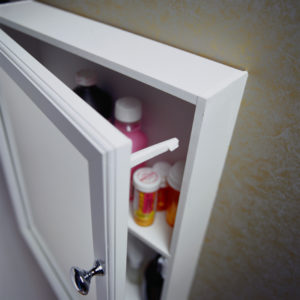Most poisonings that happen at home involve products like medications and cleaners. Following three basic principles when it comes to medications and household products can help you prevent poisonings and make you and your family safer.
Safe Use
Follow all the directions on the product packaging. Read the directions each time you use the product.
 |
|
| Storing your medications up high in a locked cabinet can help prevent poisonings. |
For medications, the directions may include information like:
- When to take it and how often
- Whether to take it with food or water
- Whether you need to avoid alcohol, certain foods, or certain other medications
If it is a prescription medication, it should only be taken by the person it was prescribed to.
It’s important to know what medical conditions your medications are for. If you are uncertain, have a conversation with your doctor or pharmacist.
For cleaning products, the directions will give you information such as:
- How to apply the product
- Whether you need to dilute it by mixing it with water
- Whether you need to ventilate the room while using it
- Whether you need to wait awhile before returning to the room
Many other household products will have directions on the label for safe usage. A few examples are:
- Pesticides, such as bug spray and weed killer
- Art and office supplies
- Personal care items, such as deodorants and dental products.
Safe Storage
Keep all potentially poisonous products up high, out of the reach of children and pets—in a locked cabinet if possible.
Re-seal the product as soon as you are done using it, and put it away as soon as possible.
Safe Disposal
The fewer potentially poisonous products you have in your home, the less likely a poisoning is to occur. For that reason, it’s important to safely get rid of products you no longer need as soon as possible. These can include:
- Expired medications
- Cleaning products you no longer use
- Broken household items such as compact fluorescent lightbulbs
Disposal methods depend on the type of product, as well as state and local regulations. If the product label does not give directions on how to get rid it, try contacting your town office. Many towns have specific medication take-back days or household hazardous waste collection days for items such as old cleaners and broken CFLs.




